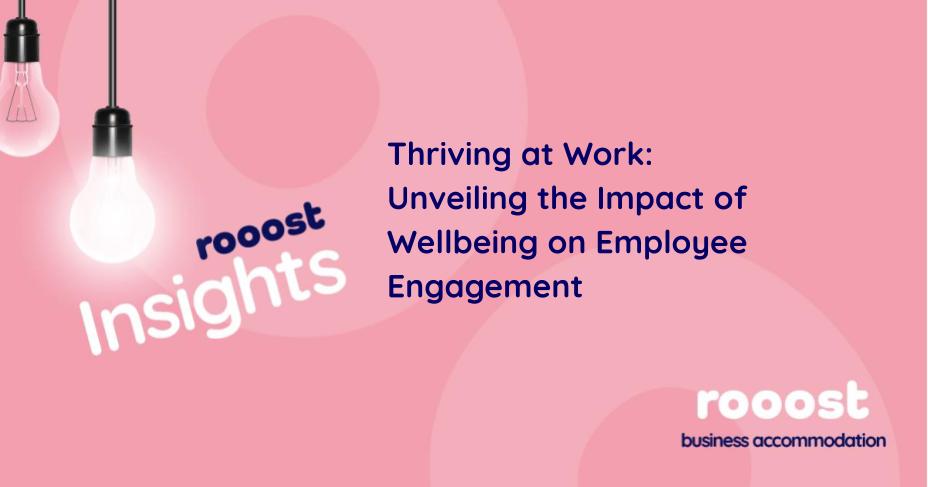Thriving at Work: Unveiling the Impact of Wellbeing on Employee Engagement

In a world that is perpetually evolving, the landscape of the workplace is no exception. The dynamics of work, coupled with the ever-increasing demands and pressures, have brought to the forefront the critical importance of employee wellbeing. The UK Work Wellbeing 2023 Report by Indeed paints a revealing picture – only 23% of workers are thriving. This statistic not only sheds light on the current state of the workforce but also raises questions about the implications for society and businesses at large.
Thriving at Work: A Rarity in the Current Landscape
The statistic, stating that only 23% of workers are thriving, underscores a concerning trend in the workforce. Thriving, in this context, extends beyond mere job satisfaction; it encapsulates a holistic sense of wellbeing that encompasses physical, mental, and emotional dimensions. This revelation prompts a deep dive into the factors contributing to this lack of thriving and its implications for both individuals and the organisations they serve.
The Cost to Society and Business
The societal and business costs associated with a workforce where only a fraction is thriving are significant. When employees are not thriving, it affects their productivity, creativity, and overall contribution to the workplace. The domino effect of this phenomenon reverberates through society, impacting everything from healthcare costs to social dynamics. The economic toll of a workforce that is not thriving is one that cannot be ignored.
Wellbeing as a Predictor of Employee Retention
The UK Work Wellbeing 2023 Report also delves into the correlation between wellbeing and employee retention. A striking revelation emerges – 86% of individuals with high wellbeing believe they will stay with their employer for the next year. This statistic serves as a testament to the powerful link between wellbeing and the commitment of employees to their organisations.
Conversely, the report indicates a stark contrast for those with lower wellbeing, where only 46% anticipate staying with their current employer for the next year. This discrepancy highlights the crucial role that wellbeing plays in shaping an employee's loyalty and longevity within a company.
Shared Responsibility: Individuals and Organisations Alike
A pivotal insight from the report is that people perceive wellbeing at work as a shared responsibility between individuals and the organisation. This perspective acknowledges the intricate interplay between personal choices and the work environment in fostering a culture of wellbeing.
The acknowledgment that "everyone plays a role" emphasises the collective effort needed to create a workplace where individuals can thrive. It underscores the importance of a symbiotic relationship between employees actively pursuing their wellbeing and organisations fostering a conducive environment for it.
Rooost's Contribution to Wellbeing in the Workplace
Amidst these revelations, the role of Rooost in enhancing workplace wellbeing takes centre stage. Rooost, with its innovative approach to accommodation, community integration, and personalised experiences, contributes significantly to the wellbeing of employees.
Creating a Home Away from Home
One of the fundamental aspects of wellbeing is the feeling of security and comfort. Rooost's serviced apartments go beyond mere accommodation; they provide a home away from home. In an era where remote work and business travel are increasingly prevalent, having a comfortable and nurturing living space is paramount for employee wellbeing.
The 8-8-8 Rule: Balancing Work and Life
Rooost introduces the 8-8-8 Rule, a unique concept that emphasises a balanced approach to work and life. This rule encourages employees to spend eight hours working, eight hours for personal activities, and eight hours for rest and rejuvenation. By promoting a healthy work-life balance, Rooost addresses a crucial aspect of overall well being.
Community Integration and Wellness Initiatives
Rooost takes a holistic approach to wellbeing by fostering community integration within its living spaces. Social connections and a sense of belonging contribute significantly to an individual's overall happiness and satisfaction. Rooost's commitment to wellness initiatives further amplifies its role in creating an environment where individuals can thrive both personally and professionally.
The Intersection of Wellbeing and Productivity
The UK Work Wellbeing 2023 Report underscores the interconnectedness of wellbeing and productivity. Thriving employees are more likely to be engaged, innovative, and committed to their organisations. Rooost's contribution to wellbeing, therefore, goes beyond the immediate comforts of accommodation; it extends to enhancing employee engagement and productivity.
Creating a Blueprint for Wellbeing in the Workplace
In conclusion, the revelations from the UK Work Wellbeing 2023 Report are a call to action for individuals and organisations alike. The shared responsibility for wellbeing necessitates a collaborative effort to create workplaces where everyone can thrive.
Rooost's role in this narrative is not merely as a provider of accommodation but as a facilitator of holistic wellbeing. By offering a supportive living environment, promoting work-life balance through the 8-8-8 Rule, and fostering community integration and wellness initiatives, Rooost becomes an integral part of the blueprint for a thriving workplace.
In a world where the cost of a workforce not thriving is significant, initiatives like Rooost become beacons of hope, illustrating that a focus on wellbeing is not just an investment in the individual but a strategic decision that pays dividends for both society and business. As the report suggests, everyone plays a role, and Rooost stands at the forefront, championing the cause of wellbeing in the modern workplace.

 share
share